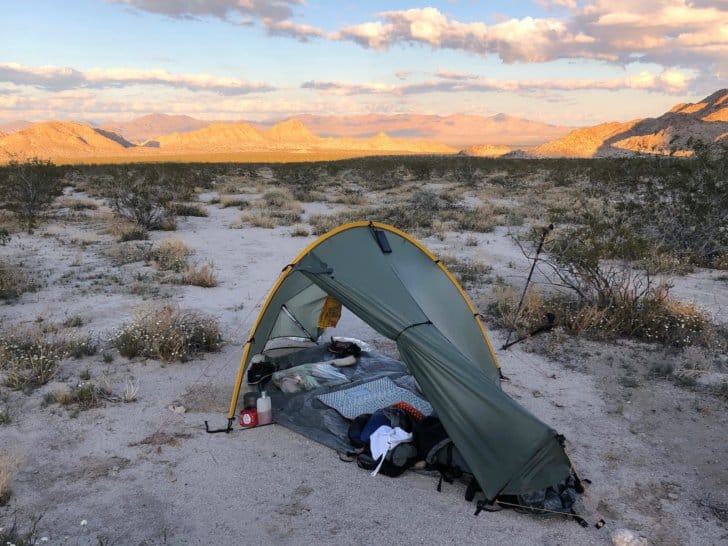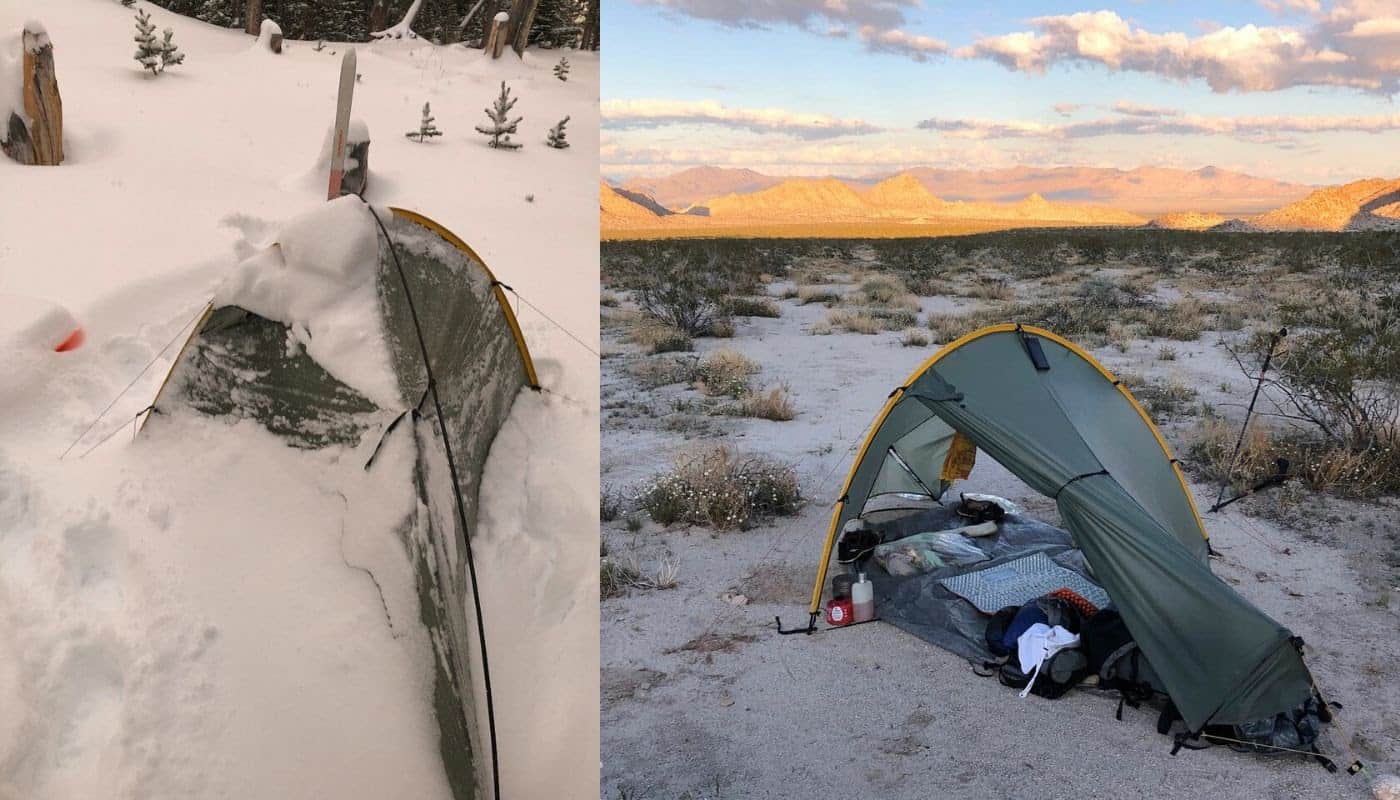by Drew Smith and Ryan Jordan
Table of Contents • Note: some sections may only be available to Premium or Unlimited Members.
- Introduction
- Performance Assessment
- Description of Field Testing
- List of Performance criteria
- Test Methods
- Test Environments
- Our Experience With Similar Tents
- Inclement Conditions Performance – Winter
- Inclement Conditions Performance – Desert
- Inclement Conditions Performance – Heavy Rain
- Livability
- Ease of Setup
- Versatility
- Quality
- Durability
- Weight
- Value
- Commentary
- Review Rating: Highly Recommended
- Where to Buy
- Related Content
Introduction
The Tarptent Moment DW is a one-person, single-hoop tunnel, silnylon double-walled backpacking tent. It has a fly-and-inner modular design that enables configuration for different use case scenarios in all four seasons. Depending on the options chosen, it weighs between 24 and 44 oz (680 – 1247 g) and costs $325 – $506.

About this Review
This Performance Review is based on our direct experience using the Tarptent Moment DW in three use-case extremes:
- as a minimalist, fly-only shelter for desert travel,
- as a double-wall winter tent in blizzard conditions, and
- as a double-wall three-season tent in heavy rainstorms.
We used the Tarptent Moment DW in desert and winter environments (Drew), and in heavy rain and high wind scenarios (Ryan). In addition, Ryan has extensive experience with similar single-hoop tents (the Hilleberg Akto and Enan, and Terra Nova Laser series), and we provide appropriate comparisons when assessing the performance of the Moment DW in the context of this market category.
Features
- double-wall, dual entry, dual vestibules
- full-coverage fly to block wind, rain splash, and spindrift
- removable inner tent stays dry during setup
- single arch pole, 2 stake design for simple set up and small footprint
- carbon fiber struts raise ends for increased useable space and end ventilation
- fly overhangs entrance to block precipitation when entering and exiting
- fly door can be opened at the top or raised at the bottom to improve ventilation
- optional end-to-end crossing pole improves wind and snow strength, makes tent freestanding
- choice of mesh or solid inner tent
- inner tent width can be decreased to increase vestibule space for storage or cooking
Specifications
Numbers in [brackets] indicate our measurements.
- sleeps: 1
- seasons: 3-4
- interior peak height: 39 in (99 cm) [39 in]
- inner tent floor width: 20/42/20 inches (51/107/51 cm) end/middle/end [19/42/19 inches]
- inner tent floor length: 84 in (213 cm) [86 in]
- inner tent area: 18.6 sq ft (1.7 sq m) [18.1 sq ft]
- vestibule area (combined): 11.1 sq ft (1.0 sq m) [13.2 sq ft]
- packaged weight (includes fly, mesh inner, struts, hybrid carbon arch pole, stakes, guylines, and stuff sacks): 34 oz (970 g) [35 oz / 992 g after seam sealing]
| component | weight, measured |
|---|---|
| fly, struts, and hoop pole | 24.1 oz (683 g) |
| mesh inner tent | 11.0 oz (312 g) |
| solid inner tent | 13.3 oz (377 g) |
| optional crossing pole | 6.9 oz (196 g) |
Product Category Overview
The Moment was first introduced as a hybrid (single/double) wall shelter in 2009. Chris Murphy reviewed the original design at Backpacking Light in 2010. A double-walled version was introduced in 2013 and it was updated in 2019. The latest update incorporated the following changes:
- re-engineered arch and fly geometry, for a tighter pitch
- 9 mm arch pole standard, for increased stability
- 3,000 mm hydrostatic head pressure rating for fly and floor, for additional waterproofness
- 2-way #5 waterproof separating vestibule zippers, for better ventilation and more durability
- smaller footprint, for pitching in tighter places
The Tarptent Moment DW is primarily a single hoop, double-wall non-freestanding tent, and we compare it to other tents in this category, including perhaps its best-known competitors, the Hilleberg Akto and Hilleberg Enan.
However, the Moment DW’s modularity and component options make it somewhat of a category-spanner that reaches in two different directions. Without its inner tent, it becomes a stable, full-perimeter, floorless shelter. With a solid fabric inner and optional end-to-end crossing pole, it becomes a four-season tent capable of handling blizzard conditions and snow loading. Therefore, much of this review focuses on its versatility.
In this review we thus aim to address these questions:
- Could the Tarptent Moment DW be the only shelter system a backpacker needs, from desert sands to mountain snows?
- What compromises does it make in attempting to be a do-everything tent?
- How does it stack up against other lightweight double-wall 4-season tents?
Design/Technology Overview
The Moment DW seems to feature no outstanding innovations in overall design or materials over previous versions or its obvious competitors. Its strengths lie instead in execution and attention to details, and the integration of its design elements to enable performance in a variety of configurations.
Member Exclusive
A Premium or Unlimited Membership* is required to view the rest of this article.
* A Basic Membership is required to view Member Q&A events




Home › Forums › Tarptent Moment DW Review (2019 Version)